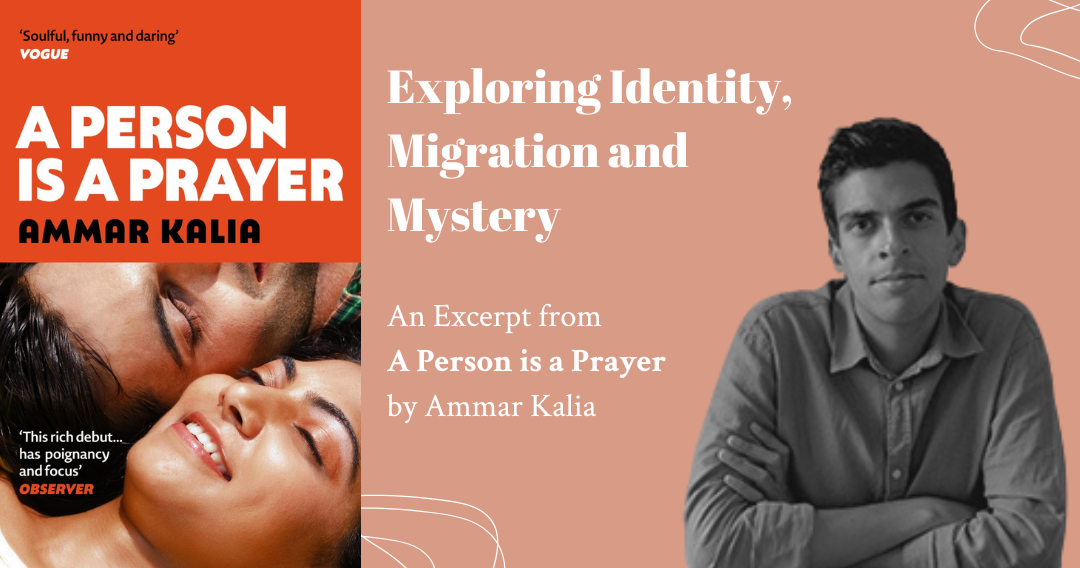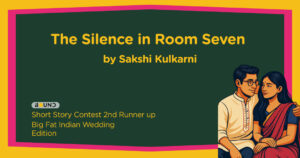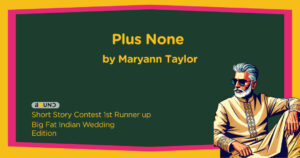Not now, he spluttered. The breath whipped from his lungs leaving him hollow. It was happening again. He stopped walking, hunched over and covered his quivering mouth. He was starting to sweat profusely, threatening to seep through his only suit. He saw himself looking like one of the clerical workers on the sunrise trains who had crescent moons of damp cupping their flopping breasts. But he would have to worry about his appearance another time.
He placed his palm on the damp wall of a shack as two passing boys in greying vests glared at him. He tried to breathe but could only wheeze out a rattling sound. They were so skinny they were probably worried he’d eat them. He was careful not to lean too hard in case the whole facade caved in.
This place seemed nothing more than the sun, dust and an eternal hum of competing voices. He made sure the boys couldn’t see him touch his pocket to check that his wad of rupees was still there, along with the worn paper of his train ticket. As long as he had his cash, he would be alright, he reassured himself. His breathing loosened. Money always bestowed a protective aura – it was so much more efficient than the empty promises of prayer.
He decided to start moving again; it couldn’t be too much further. There were no pavements around him, just stacks of assorted rubble people hopped over while avoiding the meandering chaos of the rickshaws. It also stank of shit, thanks to the open gutters sloshing along the side of the road. Every time he passed a waiting, solemn cow in the street he had to avoid dipping his polished brogues into the filth. He didn’t belong in a place like this.
Maybe his heart was thumping and his lungs were squirming because this was supposed to be his homecoming, a return to the country of his people. But there was no fanfare waiting, only lingering looks. He felt like shouting. Didn’t they know it was rude to stare?
In India, Bedi was a tourist, not a prodigal son. He had been born in a different country, into a different shade of skin from the locals and a different sense of loyalty to their rulers. It was all because his father took up the offer of moving to another colony to work on the railroads, the offer of a better life. He was worried these Indians could smell the subservience on him and he hoped the family he was coming to see wouldn’t be so perceptive. He was on his way to meet and impress their daughter – some village girl he would be expected to spend the rest of his life providing for. Some deal.
It was his father’s idea. Ever since his mother had died and Bedi had started shooting out of bed to gulp the cool night air – to calm this pair of lungs he was sure was growing too fast inside his chest – his dad had begun to notice him again.
As kids, he and his three brothers only experienced their dad as a soothing absence or a terrifying presence. He was often on week-long trips to Mombasa, sloshing petrol into his cap to cool his bald head as the inferno of the engine enveloped him. While he was away, the boys would become the men of the house, hurrying to the bank to withdraw their father’s weekly salary, purchasing groceries for their mother – with added luxuries – and feeling like they were giving back some of the care she so freely gave them. When their father returned, it was always a different story. Now, they stood to attention by the dinner table, ready to deliver salt or sabzi as he kept his eyes fixed on the table and ate with fastidious care. They were equally ready to receive a kick on the backside or a slap along the legs if they were too slow or spilled the goods on their way. At 25, Bedi still struggled to eat before someone told him he could do so. He felt his stomach rumble with anticipation.
He didn’t have a watch so he didn’t know what time it was, but it felt like he was late. That feeling like the world was moving too fast and he was going too slowly, like the seconds were clicking offbeat, gently reminding him that he should be running. He could have taken a rickshaw from the station but Mrs Bhatia, that plump know-it-all who had set this whole thing up, had assured him it was only a short walk. He made her tell him the route twice, taking into account his terrible sense of direction, and she made sure to click her tongue as he noted down each turn, exasperated at this need for guidance. Did other men just always know where they were going?
At least his breathing was getting better. He made an effort to try and place himself back within his body and to exorcise whatever spirit kept kicking him out. He felt the sun warming the brim of his hat, he noted how his left knee crunched if he extended his leg too far and he took a big breath in, ballooning his chest outwards to suck up what felt like a teaspoon of the road’s gravel. He coughed reflexively and spat a wet slick of the grit back, spraying his shoes in the process. ‘Penchod’, he muttered. He heard a giggle and turned to notice those same two dark boys following him around the corner. He shooed them with a fick of his wrist and a kick of his leg that made his knee crack, again. They trotted off, unbothered and bored.
Had he once been as carefree as they were? He couldn’t remember. All he could recall as he pushed the jangling bopes of his body along the roadside was always being on the move. Always walking.
Like that eternal walk to school. Two miles every day to be told by his teachers that he was of less worth than the bricks in the walls that surrounded him. That hurt – not as much as when they threw those books at his head while he was daydreaming. He might not care much for the knowledge the books contained, but he felt he must have something he could ofter the world, eventually. Even if it wasn’t his brain.
He still hadn’t figured out what that something was. In fact, he felt like life was just spent waiting for something to happen. And perhaps that something was bad – in both cases. Maybe those two boys felt the same? He looked back to see if they were still tailing him, but they must have disappeared into the throngs of waiting men, overstuffed carts and animals. They were probably just dazed and hungry, like he always was when he was their age: five, six, seven, eight.
He remembered waking up then with a gnawing at the pit of his stomach and feeling that no matter what leftover scraps his mother fed him, he was never satisfied. It was like waking without sleep and being catapulted into an adrenalised haze, running on the need for more but not knowing where to find it. There was one promising avenue: looking through the bins on the way to school. Any bits of unrotten banana, unchewed sugar cane or unmouldy bread would soon find their way into his fist, under his nose and then eventually – after consultation with his friends – into his mouth. It all served to carry his grazed knees and dry soles to the hard chair in which he could then spend the next four hours being hungry again.
One morning, he came upon an unexpected prize: a pristine, unopened packet of biscuits. He couldn’t believe his luck — his stomach practically leapt at the sight – and he gingerly swiped them from the other foul remains, before anyone saw or could find the chance to tell him off for it. He was with his friend Raj – he was always with his friend Raj, before he died at 14 of tuberculosis – and he offered to share the bounty. ‘I don’t like the look of those, he remembered him saying. ‘You’ll get into all sorts of trouble if you eat that, Bedi.’
Still, he had already torn back the paper package and was feeling the soft lozenge between his fingers, popping it into his waiting mouth before his brain realised what his hands were doing. He offered another to Raj but he simply shook his head and gave a quizzical smile that said, ‘You’re on your own now’.
They kept on walking – past the market stalls, shopfronts and makeshift houses, off into the large fields that surrounded the tiny school building. Raj’s smile started to play in Bedi’s mind as he realised that there was something meaty about the biscuits. Still, he continued eating them – he couldn’t waste the packet now – and with each bite he felt their grain between his teeth, a warm grease running through the pressed shape.
His mouth had become worryingly dry and filled with chewy bits of biscuit debris. He tilted his head back to try and swallow, mildly panicking that he might choke otherwise. It went down, slowly, and he was reassured by the warmth of the morning sun on his face, steaming. He felt a little heavier, like he was carrying the weight of the air that was softly imprinting on his skin. It’s just one foot in front of the other, he told himself.
Those feet began dragging and Raj, who was always keen to avoid a beating for being late, was pulling ahead. “Come on, Bedi, he urged, offering his hand to pull him forwards. Bedi wanted to take it but he found himself slowing as something started to come up. A cold sweat beaded on his forehead and a rush of saliva pushed its way from the back of his mouth to his lips. He tried to calm himself by thinking of when the sudden rain would fall with such force that it seemed the whole world was crashing down. Like the sky wanted to get close and touch him.
The next minute he wretched a slick pool of bile – a green and brown impression – churning the dusty road into mud.
He needed to get a hold of himself, Bedi thought as he carried on now, a man walking. Why was he bringing up a memory that made him want to gag? At least once he was sick it was over, unlike this spasming of his lungs that seemed like it would never go away. He had his mother’s comfort back then too, her soft voice telling him it would be ok – a counter to his dad’s bark that soon told him he had been eating biscuits made for animals. If you want to be a dog so much, you should start living outside, he remembered him laughing.
Like all men, Bedi missed his mother. He missed her voice and he missed her dependence, her need for love. He wished now that he could have shown her more, told her how much he would miss her when she was no longer here. Of course, somehow, he assumed she would live forever. The quiet ones always survive, he used to think; his father with his swagger and shout, he would be long gone, but his mother would grow old with him. Finally, they would be together.
Yet, once she died, his dad decided his eldest son needed to be married off immediately. His mother would have probably liked to keep him home permanently but now her ashes were scattered, his father had given Bedi until 25 to find an acceptable wife. He responded by spending almost all of his late teens and early twenties drinking, chasing the wrong girls and trying his hand at gambling his pay packets away. That time had soon run out.
Excerpted with permission from A Person is a Prayer by Ammar Kalia
Publishing/ Penguin Random House (2024)
You can buy your copy here.

Ammar Kalia
Ammar Kalia is a writer, musician and journalist living in London. Since 2019, he has been the Guardian’s global music critic and has written for publications including the Observer, BBC, Dazed, Mixmag, The Economist, Downbeat and Crack. In 2020, he published a collection of poetry and an accompanying album, Kintsugi: Jazz Poems for Musicians Alive and Dead, and in 2022, his essay on music and identity was included in the collection Haramacy. A Person Is a Prayer is Kalia’s debut novel and was shortlisted for the Unbound Firsts Prize in 2022.








